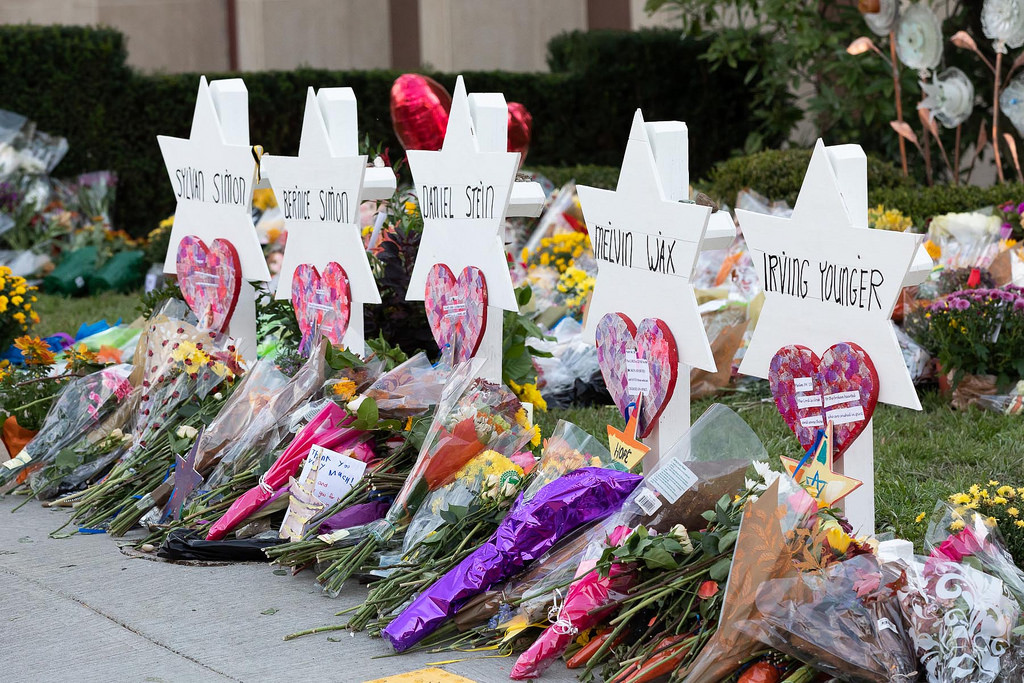It’s Time for Congress to Make Domestic Terrorism a Federal Crime
On Oct. 27, Robert Bowers launched an attack on the Tree of Life Synagogue in Pittsburgh, Penn., murdering 11 worshipers and injuring many others. The federal indictment against Bowers charges him with multiple counts of obstructing, by force and threat of force, “the free exercise of religious beliefs” resulting in death and bodily injury and involving the use of a dangerous weapon and attempts to kill.

Published by The Lawfare Institute
in Cooperation With

On Oct. 27, Robert Bowers launched an attack on the Tree of Life Synagogue in Pittsburgh, Penn., murdering 11 worshipers and injuring many others. The federal indictment against Bowers charges him with multiple counts of obstructing, by force and threat of force, “the free exercise of religious beliefs” resulting in death and bodily injury and involving the use of a dangerous weapon and attempts to kill. These counts are charged under a suite of federal hate crimes statutes first enacted in 1968 and amended periodically ever since. Some of these crimes allow for the maximum sentence under law: the death penalty. But they fail to hold Robert Bowers accountable for what he actually did: commit crimes of domestic terrorism.
Bowers is just as morally deserving of the “terrorist” label as Islamist extremists who engage in acts of violence to intimidate and coerce. That label carries weight—it creates a moral equivalency between domestic terrorists and international terrorists, and it signals to Americans that the threat of extremism is just as significant when it is based on domestic political, economic, religious or social ideologies as it is when based on Islamist extremist ideologies. This has become ever more important as the United States experiences increased incidents of violence, and threats of violence, perpetrated on behalf of extremist right-wing ideologies. There are no good terrorists, domestic or international. It is time for Congress to enact a federal offense of domestic terrorism.
I recently had occasion to talk about domestic terrorism at a summit in St. Louis as part of Communities Overcoming Extremism: the After-Charlottesville Project—a national capacity-building project, with broad bipartisan sponsorship, designed to bring state and local leaders and civil society together to share strategies for combating the rise of hate and extremist violence in our country. From the comments of those with whom I spoke after the panel, it was clear that many people had not previously understood the difference, at least under federal criminal law, between domestic terrorism and international terrorism. “International terrorism” is defined in the United States Code as activities that: (1) “involve violent acts or acts dangerous to human life,” (2) violate federal or state criminal laws or would do so if committed in the jurisdiction of the United States or any state, (3) appear intended “to intimidate or coerce a civilian population,” “to influence the policy of a government by intimidation of coercion,” or “to affect the conduct of a government by mass destruction, assassination, or kidnapping”; and (4) “occur primarily outside the territorial jurisdiction of the United States, or transcend national boundaries.” “Domestic terrorism,” on the other hand, is defined in the United States Code exactly the same way, except for the fourth element. Rather than occurring primarily outside the United States or “transcend[ing] national boundaries,” domestic terrorism occurs “primarily within the territorial jurisdiction of the United States.”
Why then, people wanted know, are Islamist extremists who commit violent crimes in the United States with the intent to intimidate and coerce—or who merely send money or other support to Islamist extremist groups like al-Qaeda or the Islamic State—charged with crimes of international terrorism, while anti-Semites like Robert Bower and white supremacists like Dylann Roof—who killed nine black parishioners at a Charleston, South Carolina church in 2015—are charged with hate crimes but not domestic terrorism? The reason is twofold. First, for persons who commit their crimes on behalf of a designated foreign terrorist organization (FTO) like al-Qaeda or the Islamic State, those crimes are considered to “transcend national boundaries” and are thus treated as crimes of international terrorism, even if the acts that are the basis for the crimes take place in the United States. Second, although the U.S. Code contains definitions of both international and domestic terrorism, the most commonly charged crimes of terrorism that are codified in the chapter titled “Terrorism” relate primarily to international terrorism.
For example, had the San Bernardino shooters Syed Farook and Tashfeen Malik survived their pledge of “bayat,” or allegiance, to the leader of the Islamic State before using assault rifles to kill 14 people and injure many others, they likely would have faced charges for a panoply of international terrorism offenses—including providing material support to a designated FTO resulting in death and the aptly named “act of terrorism transcending national boundaries.” But even though Robert Bowers committed a strikingly similar crime using an assault rifle and other firearms, there is no terrorism crime that applies to his conduct. Had he used a bomb or radiological dispersal device or nuclear material, he could have been charged with a crime included in the “Terrorism” chapter of the U.S. Code. But use of a firearm to kill and injure is not itself a federal crime of terrorism if done with intent to intimidate or coerce in furtherance of a domestic extremist cause like white supremacy, rather than a foreign extremist cause like Islamist jihad, promoted by an FTO.
Or consider James Fields’s use of his car to plow into a group of counter-demonstrators at the August 2017 Unite the Right rally in Charlottesville, Va., killing Heather Heyer and severely injuring many more. Use of a vehicle to kill or injure is not a federal crime of terrorism when done to further a domestic extremist cause. Had that same act been committed by someone who did so in the name of the Islamic State, however, with intent to intimidate and coerce, it would be prosecutable as an international terrorism offense.
Some might say that there is no need for a crime of domestic terrorism to ensure adequate punishment, and that is certainly true. As I’ve written previously, ample criminal statutes provide for substantial punishment for those who commit violent crimes in furtherance of domestic extremist causes. Murder is a crime in all 50 states, punishable by life imprisonment or, in some states, death; and hate crimes resulting in death, like the charges faced by Robert Bowers and James Fields and previously faced by Dylann Roof, are punishable by life imprisonment or death. But you’ll never see the word “terrorism” on those indictments; a successful conviction won’t include the word “terrorism”; and you generally won’t hear federal prosecutors referring to the offenders as terrorists, at least not before a conviction.
Could prosecutors call an alleged offender like Robert Bowers a terrorist, even without a federal crime of domestic terrorism? Probably, but the offender might then complain to the court that use of that word, where not supported by the actual crimes with which the offender is charged, unfairly prejudices the public and the jury against him and makes it impossible to get a fair trial. That’s a risk many prosecutors won’t take.
There’s a solution to this: enact a federal crime of domestic terrorism. Such a statute need not involve the designation of domestic terrorist organizations—a proposition that arouses legitimate fears of government abuse of authority directed toward unpopular ideologies. Instead, it could penalize the commission of specifically enumerated violent crimes such as murder, kidnaping, maiming, and assault with a dangerous weapon, when committed with one of the intents already listed in the definition of domestic terrorism: “to intimidate or coerce a civilian population,” “to influence the policy of a government by intimidation of coercion,” or “to affect the conduct of a government by mass destruction, assassination, or kidnapping.” When committed with one of these intents, crimes of domestic terrorism, while perhaps not transcending “national” boundaries, unquestionably transcend “state” boundaries. They are not merely local crimes and they are not merely hate crimes. They are crimes of terrorism—and it’s time our federal criminal code recognized it.
The creation of a federal crime of domestic terrorism would also counter the widespread but incorrect notion that the federal government does not care about domestic terrorism. Although I know from my many years at the Department of Justice that the department, and other federal agencies like the Department of Homeland Security and the Federal Bureau of Investigation, are indeed concerned about domestic terrorism, there’s no question that more federal resources have been put toward fighting the threat of international terrorism since 9/11 than fighting domestic terrorism. And recent data shows that, since 9/11, domestic terrorism incidents resulting in death here in the homeland occur far more frequently than international terrorism incidents resulting in death. With enactment of a federal domestic terrorism offense would come a bigger budget and more resources for preventing attacks like the assault on the Tree of Life Synagogue.
It also would provide for better record-keeping and data analysis. Under current Justice Department guidelines, every single crime charged under the Terrorism chapter of the U.S. Code must be coordinated and approved through the department’s National Security Division. Thus, the Justice Department has perfect records of every prosecution of international terrorism. But since relatively few crimes of domestic terrorism are prosecutable under that chapter, the department lacks comprehensive data on domestic terrorism incidents around the country. Perhaps the closest data set is based on voluntary reporting of hate crimes to the FBI from state and local law enforcement agencies, which severely undercounts such crimes. Although enactment of a federal domestic terrorism offense would not entirely eliminate this reporting problem, it could not help but to improve the accuracy of the data and enable better strategies to combat the threat.
Some might worry that this would open the door to increased government surveillance at home in the name of protecting against domestic terrorists. But the surveillance techniques currently used to combat international terrorism under the Foreign Intelligence Surveillance Act are limited to the collection of foreign intelligence and cannot be used solely for the collection of domestic intelligence. The criminal authorities currently on the books—which are used to investigate criminal drug trafficking gangs, child exploitation and human trafficking, and white collar crimes—are adequate to investigate crimes of domestic terrorism without any additional authorities. To the extent that the use of these existing authorities—subpoenas, search warrants, and Title III warrants, for example—causes concern when applied to investigating domestic terrorism, that's a reasonable conversation to have. But let’s not keep applying a double standard in our federal criminal code, penalizing Islamist extremist violence as terrorism but most domestic extremist violence as hate crime. The crimes Robert Bowers is alleged to have committed are crimes of terrorism, and they should be prosecuted that way.



.jpg?sfvrsn=d45482bc_5)

